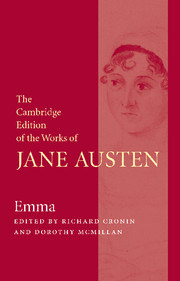Chapter 15
Published online by Cambridge University Press: 18 December 2020
Summary
EMMA was not required, by any subsequent discovery, to retract her ill opinion of Mrs. Elton. Her observation had been pretty correct. Such as Mrs. Elton appeared to her on this second interview, such she appeared whenever they met again,—self-important, presuming, familiar, ignorant, and ill-bred. She had a little beauty and a little accomplishment, but so little judgment that she thought herself coming with superior knowledge of the world, to enliven and improve a country neighbourhood; and conceived Miss Hawkins to have held such a place in society as Mrs. Elton's consequence only could surpass.
There was no reason to suppose Mr. Elton thought at all differently from his wife. He seemed not merely happy with her, but proud. He had the air of congratulating himself on having brought such a woman to Highbury, as not even Miss Woodhouse could equal; and the greater part of her new acquaintance, disposed to commend, or not in the habit of judging, following the lead of Miss Bates's good-will or taking it for granted that the bride must be as clever and as agreeable as she professed herself, were very well satisfied; so that Mrs. Elton's praise passed from one mouth to another as it ought to do, unimpeded by Miss Woodhouse, who readily continued her first contribution and talked with a good grace of her being “very pleasant and very elegantly dressed.”
In one respect Mrs. Elton grew even worse than she had appeared at first. Her feelings altered towards Emma.—Offended, probably, by the little encouragement which her proposals of intimacy met with, she drew back in her turn and gradually became much more cold and distant; and though the effect was agreeable, the ill-will which produced it was necessarily increasing Emma's dislike. Her manners too—and Mr. Elton’s, were unpleasant towards Harriet. They were sneering and negligent. Emma hoped it must rapidly work Harriet's cure; but the sensations which could prompt such behaviour sunk them both very much.—It was not to be doubted that poor Harriet's attachment had been an offering to conjugal unreserve, and her own share in the story, under a colouring the least favourable to her and the most soothing to him, had in all likelihood been given also. She was, of course, the object of their joint dislike.
- Type
- Chapter
- Information
- Emma , pp. 303 - 312Publisher: Cambridge University PressPrint publication year: 2005

